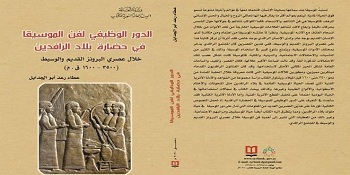Book Review
Damascus (ST): Man has known music for ages, deriving it from the elements of nature. He tried to imitate it in response to his innate desires to express himself and his feelings. But the most prominent breakthrough that music knew was with the civilization of Mesopotamia, where it flourished to become an independent art and science linked with many other arts and sciences. According to the book issued electronically by the Syrian General Book Authority entitled “The Functional Role of Music in the Civilization of Mesopotamia during the Old and Medieval Bronze Ages 3500/1600 BC,” archaeological excavations in many Mesopotamian sites revealed large numbers of evidence that document the prevailing musical culture in the country during those eras. The book, written by researcher Ataa Raad Abu Al-Jadayel, sheds light on the motives and reasons that led to the development of music in that early period in the history of the Mesopotamian civilization, revealing its role and the extent of its integration into the details of daily life.
According to the book, the study and analysis of archaeological evidence represented by scenes carried various types of artistic production, as well as ancient written texts, from the knowledge of important points related to the areas of use of music on the religious and secular levels, and to stand on the symbolism of this art in ancient Mesopotamian thought. The book sought to bridge the gap related to the functional role of Mesopotamian music by revealing the occasions, descriptions, organization, genres and objectives of musical performances the people present and the musicians, their gender, their life, their organization, and their position in society.
The book is divided into three chapters, the first of which is a set of archaeological evidence that bears scenes describing the musical life existing in Mesopotamia during the ancient and medieval eras, such as sculptures, remnants of vases, pots, inlays, cylinder seals and clay tablets.
The second chapter examined the types of music and the areas of its use in daily life, based on the analysis of scenes documented by evidence and artifacts.
As for the third chapter, it defines the functional role of music in the Mesopotamian civilization, through the written archaeological evidence dating from the ancient and medieval Bronze Age, where ancient written texts carry information indicating the role of music in religion and in life activities in addition to researching the lives of musicians and their social ranks, which reflects The importance of music during those eras.
K.Q.

